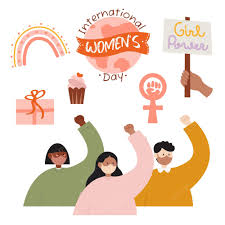
International Women’s Day (IWD) is celebrated on 8 March around the world. It is a focal point in the movement for women’s rights.
Origins
After women gained suffrage in Soviet Russia in 1917, 8 March became a national holiday there. The day was then predominantly celebrated by the socialist movement and communist countries until it was adopted by the feminist movement in about 1967. The United Nations began celebrating the day in 1977.
Commemoration of International Women’s Day today ranges from being a public holiday in some countries to being largely ignored elsewhere. In some places, it is a day of protest; in others, it is a day that celebrates womanhood.
History
The earliest Women’s Day observance, called “National Woman’s Day“, was held on 28 February, 1909, in New York City, organized by the Socialist Party of America at the suggestion of activist Theresa Malkiel.
In August 1910, an International Socialist Women’s Conference was organised to precede the general meeting of the Socialist Second International in Copenhagen, Denmark. Inspired in part by the American socialists, German delegates Clara Zetkin, Käte Duncker, Paula Thiede and others proposed the establishment of an annual “Women’s Day”, although no date was specified at that conference. Delegates (100 women from 17 countries) agreed with the idea as a strategy to promote equal rights including suffrage for women.

The following year on 19 March, 1911, International Women’s Day (IWD) was marked for the first time, by over a million people in Austria, Denmark, Germany and Switzerland. In the Austro-Hungarian Empire alone, there were 300 demonstrations. In Vienna, women paraded on the Ringstrasse and carried banners honouring the martyrs of the Paris Commune. Women demanded that they be given the right to vote and to hold public office. They also protested against employment sex discrimination.
In 1913 Russian women observed their first International Women’s Day on the last Saturday in February (by the Julian calendar then used in Russia).
In 1914, International Women’s Day was held on 8 March in Germany, possibly because that day was a Sunday, and now it is always held on 8 March in all countries. The 1914 observance of the Day in Germany was dedicated to women’s right to vote, which German women did not win until 1918.
In London, there was a march from Bow to Trafalgar Square in support of women’s suffrage on 8 March, 1914. Activist Sylvia Pankhurst was arrested in front of Charing Cross station on her way to speak in Trafalgar Square.